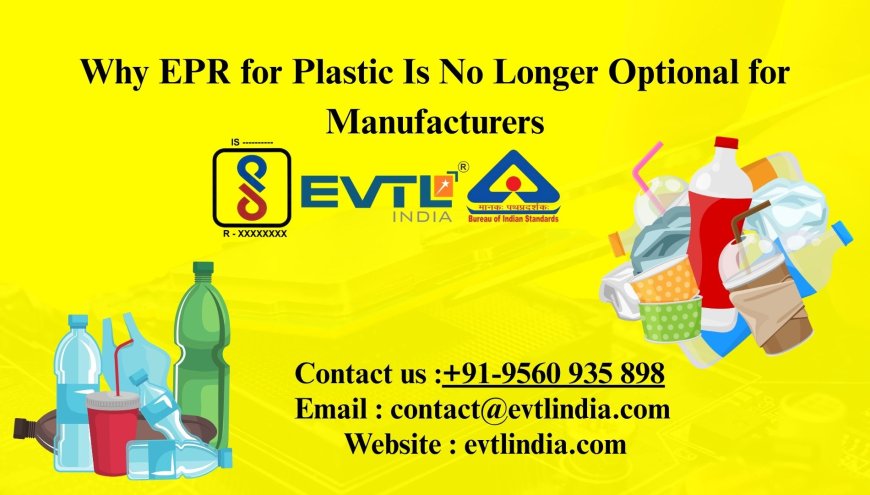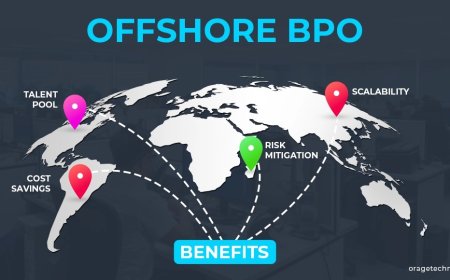Why EPR for Plastic Is No Longer Optional for Manufacturers
EPR for plastic is now mandatory. Learn why manufacturers must comply and how to meet regulations with ease.

As global awareness of plastic pollution intensifies, Extended Producer Responsibility (Plastic Waste EPR) is reshaping the way brands design, produce, and manage packaging.EPR for Plasticnot only ensures better environmental outcomes but is evolving to become simpler and more accessible. With regulatory innovation, digital platforms, and expert guidance from professionals like an EPR Consultant, EPR Registration Consultant, and Plastic waste consultant, staying compliant is no longer a daunting task. Indeed, the Number 1 consultant in EPR today can streamline processes end-to-endfrom EPR Registration for Plastic to guidance on Plastic EPR Government Fee and partnering with a Plastic EPR Return Consultant to finalize reporting.
This article explores how packaging compliance is becoming easier, why it matters to future-ready brands, and how a well-rounded EPR strategy can maximize circular benefits.
1. Why EPR Is Central to Packaging Innovation
EPR shifts responsibility for plastic packaging end-of-life from municipalities to producersPIBOs(Producers, Importers, Brand Owners). That means the brands bringing plastic packaging into the market are now legally responsible for its entire lifecycle
Today, EPR isn't just a compliance checkboxits a strategic catalyst for designing recyclable packaging, integrating recycled content, and developing take-back or refill solutions. As environmental regulation tightens, future-proof brands are embedding EPR into their innovation pipeline, transforming packaging design from a cost center into a competitive advantage.
2. Registration Simplified: EPR Registration for Plastic
The first step toward compliance isEPR Registration for Plastic. In India, for example:
-
If you operate in more than two states, you register via the CPCBs centralized portal; otherwise via the State Pollution Control Board
-
Documents needed include PAN, GST, IEC code (for importers), packaging data, and processing or design flow diagrams
-
Registration is valid for 1 year and can then be renewed for 3 years
A skilledEPR Registration Consultantcan dramatically ease this workhandling everything from document prep to certificate delivery.
3. The Cost Equation: Understanding the Plastic EPR Government Fee
Funding EPR systems means paying thePlastic EPR Government Fee, which comprises:
These fees support CPCB/SPCB operations and ensure viable recovery mechanisms. AnEPR Consultantcan help optimize fee liabilities by aligning packaging design and recycling targets.
4. Digital Advantage: Online Portals & Verification
Major innovation in EPR compliance is driven by digitization. In India, the CPCB portal facilitates:
-
EPR Registration for Plastic
-
Filing Annual Reports
-
Tracking recycling certificates from certified PWPs
Mandatory submission of recycling certificates from authorized processorsthePlastic EPR Return Consultantensures accurate traceability and report submission
5. Experts Who Make Compliance Easy
Navigating evolving EPR rules and logistics requires expertise. Heres where professionals play key roles:
-
EPR Consultant: Advises on strategy, eco-design, targets, and cost optimization.
-
EPR Registration Consultant: Handles documentation, registration, and regulatory liaisons.
-
Plastic waste consultant: Designs collection networks, selects recyclers, and builds sustainable infrastructure.
-
Plastic EPR Return Consultant: Collects recycling certificates, audits performance, and submits reports.
Those working with theNumber 1 consultant in EPRenjoy faster compliance, reduced risk, and more efficient practices across the board.
6. From Linear to Circular: Packaging Redefined
EPR makes packaging more sustainable by encouraging:
-
Eco-design: Mono-materials, refill formats, and minimalistic packaging
-
Recycled content use: Meeting compliance and market expectations
-
Collection systems: Tied to recyclers and waste processors
-
Certificate-driven compliance: All facilitated by digital platforms and professional guidance
By integrating EPR into packaging strategy, companies contribute to reducing landfill volumes and marine pollution while laying the path for a circular future.
7. Regulatory Targets Are Rising: Why Compliance Is Critical
Indian EPR guidelines have set ambitious goals:
-
70% packaging recovery target by 202627
To meet these, PIBOs must build infrastructure, track performance, and partner with certified PWPs. A top-tierPlastic EPR Return Consultantplays a pivotal role in ensuring reporting accuracy and compliance.
8. Global Examples: EPR Success Stories
Countries like Germany and EU states are leading by example:
-
Mandatory eco-design and recycled-content requirements
-
Centralized producer responsibility organizations managing EPR at scale
-
High recycling rates and strong market for recycled plastics
These insights can guide emerging markets toward more robust EPR systemsespecially when supported by effective consultation.
9. How to Make EPR Compliance Effortless
Heres how brands can make EPR regulatory compliance feel simple:
-
Map your plastic usecategorize by type: rigid, flexible, multilayered, compostable
-
Hire an EPR Consultant/EPR Registration Consultantto streamline documentation and portal filings
-
Pay the Plastic EPR Government Feealigned with your usage
-
Partner with certified PWPs, with aid from aPlastic waste consultant
-
Monitor and collect certificatesprocessed via aPlastic EPR Return Consultant
-
Leverage digital toolsto file reports and track performance
-
Iterate packaging designannually to reduce material use and fees
-
Generate surplus recycling certificatesfor credit trading (optional)
10. The ROI of Easy Compliance
Simplifying compliance offers tangible benefits:
-
Regulatory securityavoid fines or disruptions
-
Efficient operationssave on fees, packaging, and logistics
-
Brand leadershipalign with sustainability expectations
-
Material advantagesgain access to recycled inputs
-
Long-term growthstay ahead of evolving regulations and consumer trends
Conclusion
The future of sustainable packaging lies inEPR for Plastic compliance made easy. What was once a complex regulatory hurdle is nowEPR Registration Consultantan opportunity to rethink packaging design, reduce environmental impact, enhance brand value, and ensure regulatory certainty. By engaging expert EPR Consultants, EPR Registration Consultants, Plastic waste consultants, and Plastic EPR Return Consultants, and by leveraging government portals and credit mechanisms, producers can effortlessly meet compliancepaving the way for truly circular packaging that supports both business growth and planetary health.
FAQs
Q1: What is Plastic Waste EPR?
A regulatory system making producers responsible for the end-of-life of plastic packaging they place on the market
Q2: How do I complete EPR Registration for Plastic?
Submit necessary documents on the CPCB or SPCB portal, pay application fees, and obtain your certificateoften with help from anEPR Registration Consultant.
Q3: Who is an EPR Consultant?
A strategist who guides packaging design, cost optimization, target setting, and implementation of compliance systems.
Q4: Why choose a Number 1 consultant in EPR?
Top consultants offer proven track records, deep regulatory knowledge, quicker approvals, and stronger logistical support.
Q5: What is the Plastic EPR Government Fee?
A tiered fee based on your annual plastic usage?10K for <1?KTPA, ?20K for 110?KTPA, ?50K for >10?KTPA, plus a 25% annual renewal fee

































